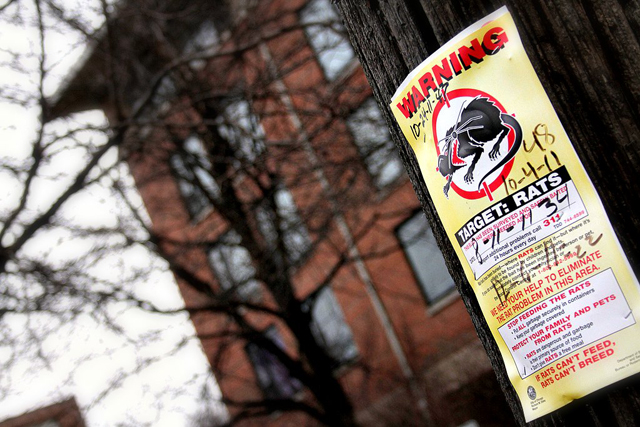Chicago Has Exciting New Plans To Kill & Chemically Castrate Its Rats
By Mae Rice in News on Jul 25, 2017 6:22PM
The City of Chicago will pilot two new rat-control techniques this summer, in the hopes of preventing issues like the rat who loved urgent care too much. (Never forget.) One technique will use dry ice to kill rats in their burrows; the other, a new bait called Contrapest, will render the rats infertile.
Thsi is not a response to a particularly thorny rat infestation in Chicago, according to officials. "The problem is not pervasive," Sara McGann, director of public affairs at Streets and Sanitation, told Chicagoist.
In fact, McGann and Josie Cruz, deputy commissioner of the Bureau of Rodent Control, told me that Chicago's 311 line actually received a slightly lower number of rat complaints this year than last year. In 2017, 311 has received just shy of 21,000 rat calls; last year, through July 24, the line received 21,365 rat complaints.
So complaints are down 2.5 percent—but we're still on pace for 40,000 rat calls this year.
Hence the imminent return of the dry ice technique, which the city first piloted in public parks and green spaces last year. This technique involves putting dry ice in rat burrows—"you shovel it in there," as McGann put it—and then stopping up the entrance. The dry ice turns to gas, and gasses the rats. This sounds horrendous from a rodent perspective—PETA, unsurprisingly, doesn't approve—but it keeps rat corpses out of human sight.
The city's other pilot, a six-month test of a rat bait called Contrapest, is already underway at the garbage transfer station at 34th & Lawndale. The city has put 25 bait boxes in the facility, McGann and Cruz said, and the hope is that it will cut down on rat breeding in the facility. It's a slow-acting bait, though; rats must "feed continuously," as they put it, for it to work.
The initial pilot of the dry ice technique was suspended last year because dry ice was not a federally-approved rodenticide, McGann and Cruz explained. It was recently cleared by the Environmental Protection Agency, though, and should go back into effect in Chicago shortly.
[H/T DNAInfo]
